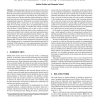Free Online Productivity Tools
i2Speak
i2Symbol
i2OCR
iTex2Img
iWeb2Print
iWeb2Shot
i2Type
iPdf2Split
iPdf2Merge
i2Bopomofo
i2Arabic
i2Style
i2Image
i2PDF
iLatex2Rtf
Sci2ools
ECAI
2010
Springer
2010
Springer
Variable Level-Of-Detail Motion Planning in Environments with Poorly Predictable Bodies
Motion planning in dynamic environments consists of the generation of a collision-free trajectory from an initial to a goal state. When the environment contains uncertainty, preventing a perfect predictive model of its dynamics, a robot ends up only successfully executing a short part of the plan and then requires replanning, using the latest observed state of the environment. Each such replanning step is computationally expensive. Furthermore, we note that such sophisticated planning effort is unnecessary as the resulting plans are not likely to ever be fully executed, due to an unpredictable and changing environment. In this paper, we introduce the concept of Variable Level-Of-Detail (VLOD) planning, that is able to focus its search on obtaining accurate short-term results, while considering the farfuture with a different level of detail, selectively ignoring the physical interactions with poorly predictable dynamic objects (e.g., other mobile bodies that are controlled by external e...
Artificial Intelligence | ECAI 2010 | Perfect Predictive Model | Planning | Sophisticated Planning Effort |
| Added | 06 Dec 2010 |
| Updated | 06 Dec 2010 |
| Type | Conference |
| Year | 2010 |
| Where | ECAI |
| Authors | Stefan Zickler, Manuela M. Veloso |
Comments (0)

